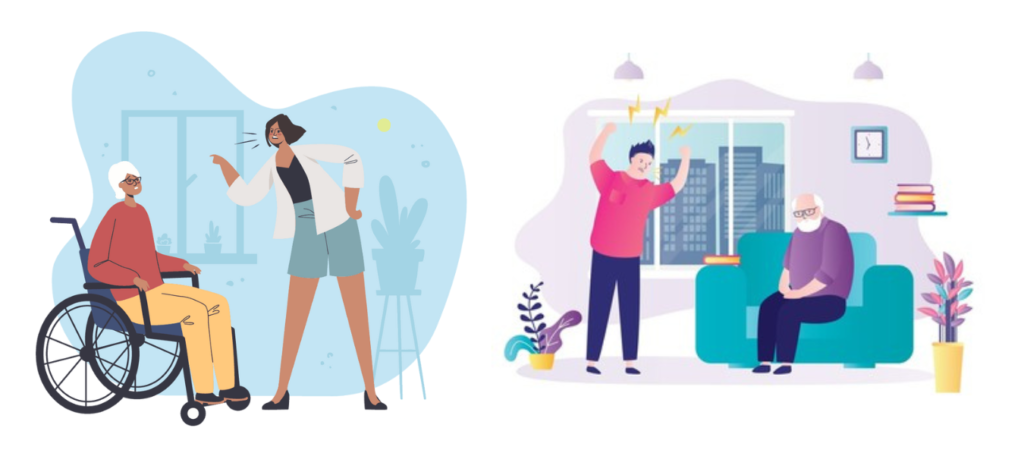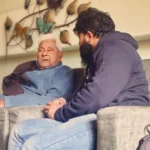Elder abuse is alarmingly prevalent, with one in 10 older adults experiencing various forms of mistreatment, including financial fraud and emotional neglect. According to World Health Organization estimates, approximately 320 million seniors are projected to suffer from elder abuse by 2050, highlighting the urgent need for awareness and action to ensure the safety and dignity of our elderly population. we will delve into the various aspects of elder abuse, shedding light on its different forms and offering essential insights into the reporting process.
Types of Elderly Abuse:
- Physical Abuse:This involves the use of force that causes injury, pain, or impairment to an older adult. Signs may include unexplained bruises, cuts, or fractures.
- Emotional Abuse: Emotional abuse includes verbal threats, humiliation, or isolation, causing emotional pain or distress. Behavioural changes, withdrawal, or fearfulness might indicate emotional abuse.
- Financial Abuse:Financial exploitation involves unauthorized use of an elder’s funds or assets. Suspicious financial transactions, sudden changes in bank accounts, or missing valuables are red flags
- Neglect: Neglect occurs when a caregiver, whether serving in the elder’s home or in a nursing home, fails to meet an elder’s basic needs, such as food, shelter, medical care, or personal hygiene. Poor hygiene, malnutrition, or untreated medical conditions can be signs of neglect.
Who are the Perpetrators:
India is not exempt from the worldwide phenomenon of increasing elder abuse. Unfortunately, a considerable portion of the senior population in India experiences many forms of abuse, mostly including physical violence, neglect, and psychological abuse. Without any explicit policy, legislation, or public assistance programme to discourage perpetrators, instances of abuse are growing rapidly. It is probable that the prevalence of elder abuse in both household and institutional environments, particularly in metropolitan India, would continue to rise.
According to a report published by HelpAge India in 2018, around 25% of older individuals in metropolitan India, out of a total of 5,014 respondents, experienced abuse.The majority of this abuse was perpetrated by their sons (52%) or daughters-in-law (34%).
Survey reveals that the most prevalent forms of abuse are:
- disrespect (56%)
- verbal abuse (49%)
- neglect (33%)
Abuse was shown to be more common among individuals aged 80 years and older, as well as among those with limited financial resources and low levels of education.
The causes of elder abuse in India are intricate and diverse. Several reasons contribute to this phenomenon:
- Socio-economic transformations: The swift process of urbanisation, industrialization, migration, and modernity has gradually destroyed the conventional joint family structure and the associated values of respect, care, and reverence towards the elderly. The elderly are frequently perceived as burdensome, liabilities, or sources of conflict by their family members or society.
- Demographic transition: The process of population ageing, characterised by longer life expectancy and lower fertility rates, has led to a greater number of elderly individuals in the population. The elderly encounter obstacles such as social isolation, financial insecurity, prejudice, and a lack of targeted interventions and resources to address their needs and entitlements.
- Legal and policy deficiencies: The current legislation and regulations regarding the safeguarding and well-being of the elderly in India are insufficient, inefficient, and inadequately enforced. The Maintenance and Welfare of Parents and Senior Citizens Act, 2007, the primary statute concerning the aged, possesses various limitations and loopholes. The legislation fails to encompass all manifestations of abuse, lacks sufficient punitive measures, does not guarantee expeditious dispensation of justice, and neglects to tackle concerns regarding institutional care, social security, and healthcare provisions for the elderly.
- Insufficient awareness and empowerment: The older population in India frequently lacks knowledge of their legal rights, entitlements, and available remedies. Additionally, individuals are hesitant to disclose or seek assistance for instances of mistreatment owing to apprehension, embarrassment, social disapproval, reliance, or a lack of confidence in others. Additionally, they are susceptible to being manipulated, intimidated, and coerced by their abusers.
How to Deal with Elder Abuse:
As discussed above, a significant number of elders face abuse and discrimination at various levels in India. In this light, it becomes important to understand what remedies are available for them and how to deal with such abuse. Some of the ways are as follows:
Contact Local NGOs:One of the most effective and easiest methods in case of elder abuse is to reach out to NGOs that specialize in elder care and protection. Some of such NGOs involved in this area are HelpAge India, Dignity Foundation, and Agewell Foundation.
File a Police Complaint (FIR):In cases of immediate danger, the elderly person should file a First Information Report (FIR) at the local police station to ensure their safety and well-being.
National Elder Helpline:The elderly person can call and contact the toll-free National Elder Helpline (Dignity Foundation) at 1800-121-1253, where they can seek guidance and assistance.
Connect with Senior Citizen Cells:Many police stations have special cells dedicated to addressing issues related to senior citizens. A visit or contact with these cells for support can ensure immediate help and protection.
Legal Aid Services:Various legal aid services provide assistance to elderly individuals facing abuse. Thus, in case of a legal battle to secure their rights, elder victims can approach Legal Aid Services in India which offers support to those who cannot afford legal representation.
Conclusion
The United Nations Principles on Older Persons and other international treaties are all-encompassing and centre on the societal obligations towards the elderly population. The State and Civil society are supposed to grant senior citizens and elderly individuals maximum autonomy and assist them in living a contented and productive life in their old age. What is even more disturbing is the lack of information among the general population regarding various national and international legislations/ treaties and the benefits thereunder, etc. It is crucial to have extensive media coverage on elder abuse across all platforms in order to raise awareness among the general public about the needs of the elderly and to educate the younger generation about the care and well-being of older adults. The government should disseminate information on the rights of elderly individuals, promote the advocacy of issues related to old age at all levels of governance, and ensure the effective implementation of policies aimed at safeguarding the interests of older persons. The education system should incorporate teachings on the disposition and conduct towards the elderly at all educational levels. An uncompromising legal and comprehensive approach to this serious issue has the potential to bring about some alterations in the present circumstances.
A senior citizen or elderly individual needs affection and respect in accordance with their personality requirements. The State and society should be dedicated to fulfilling that aspiration. A youthful individual of the present will eventually become an elderly individual in the future, and it is imperative for both age groups to prioritise and uphold the fundamental rights of one another. The elderly yearn for affection, esteem, and a chance to live a life of dignity.
References
United Nations’ Secretary-General Kofi Annan- https://news.un.org/en/story/2002/04/31702-un-forum-madrid-set-tackle-challenges-ageing-world-population.
“Elder Abuse In India – 2018”, Help Age India, available at https://www.helpageindia.org/wp-content/uploads/2018/06/ELDER-ABUSE-IN-INDIA-2018-A-HelpAge-India-report.pdf.
“Universal Declaration of Human Rights, 1948”, Art. 1.
“Conventions on the Elimination of All forms of Discrimination against Women, 1979”, Art. 11(1)(e).
“World Assembly on Ageing adopted the Vienna International Plan of Action on Ageing, 1982”.
“United Nations Principles on Older Persons, 1991”, available at https://www.ohchr.org/en/instruments-mechanisms/instruments/united-nations-principles-older-persons.
“Madrid International Plan of Action on Ageing”, 2nd World Assembly on Ageing, 2002.
“Covenant on Economic, Social and Cultural Rights, 1976.”
Harpur, Dr. Paul, (2016) “Old Age Is Not Just Impairment: The Crpd And The Need For A Convention On Older Persons”, Penn Law: Legal Scholarship Repository, Volume 37.
Indian Const., Art. 41.
Indian Const., Art. 46.
Criminal Procedure Code, 1908, Sec. 125.
Indian Penal Code, 1860, Sec. 506.
Indian Penal Code, 1860, 294.
“Maintenance and Welfare of Parents and Senior Citizens Act, 2007”.
“Hindu Adoption and Maintenance Act, 1956.”
“Missing voices: Views of older persons on elder abuse.” World Health Organization.
“Policy for the Aged: Opportunities and Challenges”, National Institute Of Rural Development & Panchayati Raj, available at http://nirdpr.org.in/nird_docs/PolicyfortheAged.pdf.
IrudayaRajan, S., “India’s Elderly: Burden Or Challenge?” New Delhi: Sage Publications and London: Thousand Oaks.





